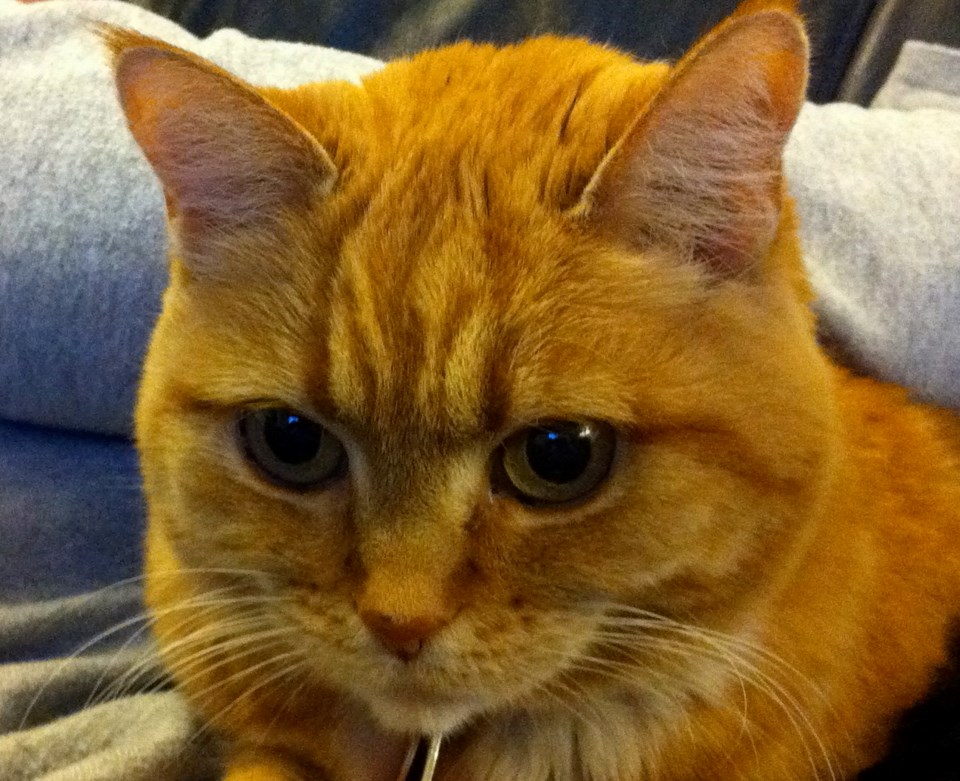A group of citizens is asking Saanich council for a cat bylaw with a complaint-driven process that would result in warnings, fines and impoundment of problem cats.
“We think the time is right for Saanich to enact a bylaw for responsible pet ownership,” Sheryl St. Gelais, speaking for the group Citizens For Responsible Cat Ownership, told Saanich council on Monday night.
“In a perfect world, cats would be licensed,” said St. Gelais, adding a bylaw to deal with problem situations is the second-best solution.
Cat bylaws are already in place in Victoria, Esquimalt, Oak Bay and Central Saanich, she said.
In Victoria, if a cat trespasses on private land without the owner or occupant’s permission, it can be impounded or the owner could be fined $150. It’s rare that both would occur, said Ian Fraser, senior animal control officer for Victoria.
A cat in a public place without immediate supervision could also be impounded or the owner fined $100.
And no animal, including cats, is permitted to chase, harass, molest, attack, injure or kill an animal. “That’s a $300 ticket,” said Fraser, adding the intent of the bylaw is to get voluntary compliance without imposing fines or impounding pets.
Esquimalt has similar rules, he said.
The Saanich delegation said roaming cats are a problem, and should be better controlled for environmental and health reasons. St. Gelais said her neighbour’s cat sprays urine on the grapes in her garden and defecates on her vegetable garden, as well as the soil near her front door. “It’s disgusting,” she said, adding the cat also lounges on her patio furniture, shedding fur that creates a problem for family and friends with allergies.
Roaming cats also defecate in play areas. “Do you mind if your child or grandchild is exposed to cat feces in their play area?” she asked councillors.
Fraser said animal-control officers receive calls about cats hanging off bird feeders and bird baths, defecating on properties, fighting other cats and causing their owners large veterinarian bills, scratching and damaging cars and other property, and entering people’s houses and causing damage.
“I’ve heard all these things before,” said Fraser. “Some neighbourhoods are more tolerant of cats roaming about and some folks are not as tolerant for a whole bunch of reasons.”
One of those reasons is the fact that feral cats are deemed the single biggest human-related killer of wild birds in Canada, St. Gelais said, citing the Victoria Natural History Society, which advocates cat licensing and mandatory spay-neuter programs.
Dogs are controlled in sensitive areas such as Swan Lake and Rithet’s Bog, but cats are not, she said.
Coun. Karen Harper said in an interview she has seen the problem of roaming cats at Mystic Vale, a forested ravine just outside Ring Road at the University of Victoria.
Harper said the idea of a cat bylaw is worth further investigation. “[The presentation] gave us a great deal to think about.”
Mayor Fred Haynes said the delegation made a well informed presentation on the value of a cat bylaw: The biodiversity impacts, cat health and human health.
“At present I am not aware of consideration of such a bylaw by council,” said Haynes. “That said there needs to be some time for council to digest the information and confer with staff.”
Saanichton resident Ann Nightingale supported the proposal for a cat bylaw in a letter to council.
“I am writing this to assure you that people who love cats also support this kind of legislation,” said Nightingale, a self-described life-long cat person who has two 14-year-old cats.
Nightingale, known for her advocacy on behalf of birds, said she almost lost her cat once when it ran into someone’s carport where there was a tin of sardines laced with antifreeze.
She reported the incident and never let her cats roam again.
“There are a lot of people willing to poison and kill cats that come onto their properties,” Nightingale said.
“Requiring residents to take responsible care of their pets, in my opinion, is a soft step in the right direction, and is the least that Greater Victoria’s most populous municipality should adopt.”



